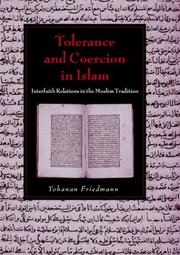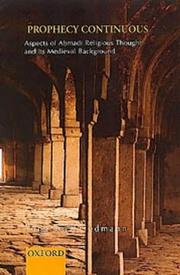| Listing 1 - 10 of 13 | << page >> |
Sort by
|

ISBN: 1107138124 1280161485 0511121482 051106263X 0511204868 0511326432 0511497563 0511071094 9780511062636 0511056303 9780511056307 9780511326431 9780521827034 0521827035 9780511121487 9780511497568 9781280161483 9780521026994 0521026997 Year: 2003 Publisher: New York Cambridge University Press
Abstract | Keywords | Export | Availability | Bookmark
 Loading...
Loading...Choose an application
- Reference Manager
- EndNote
- RefWorks (Direct export to RefWorks)
Since the beginning of its history, Islam has encountered other religious communities both in Arabia and in the territories conquered during its expansion. Muslims faced other religions from the position of a ruling power and were therefore able to determine the nature of that relationship in accordance with their world-view and beliefs. Yohanan Friedmann's original and erudite study examines questions of religious tolerance as they appear in the Qur'an and in the prophetic tradition, and analyses the principle that Islam is exalted above all religions, discussing the ways in which this principle was reflected in various legal pronouncements. The book also considers the various interpretations of the Qur'anic verse according to which 'No compulsion is there in religion ...', noting that, despite the apparent meaning of this verse, Islamic law allowed the practice of religious coercion against Manichaeans and Arab idolaters, as well as against women and children in certain circumstances.
Religious tolerance --- Liberty of conscience (Islam) --- Apostasy --- Islam --- Minorities (Islamic law) --- Islamic law --- Apostasy (Islam) --- Kufr (Islam) --- Islam. --- Relations. --- Arts and Humanities --- History --- Islamic civlisation --- Arabia --- expansion of Islam --- religious tolerance --- the Qur'an --- the prophetic tradition --- religious coercion
Book
ISBN: 0773592814 9780773592810 9780773500686 Year: 1971 Publisher: Montreal Beaconsfield, Quebec
Abstract | Keywords | Export | Availability | Bookmark
 Loading...
Loading...Choose an application
- Reference Manager
- EndNote
- RefWorks (Direct export to RefWorks)
Aḥmad Sirhindī, --- Ahmed Faruki Serhendi, --- Serhendi, Ahmed Faruki, --- Mujaddid-i Alf-i S̲ānī, --- Sirhindī, Aḥmad Fārūqī, --- Sirhindī, Shaik̲h̲ Aḥmad, --- Shaik̲h̲ Aḥmad Sirhindī, --- Maḥbūb-i Subḥānī, --- Imām-i Rabbānī, --- Naqshbandī, Aḥmad Sirhindī, --- ،احمد سرهندي --- Mujaddad Alf-i S̲ānī, --- Fārūqī Sirhindī, Shaik̲h̲ Aḥmad, --- فاروقى سرهندى، شيخ احمد، --- فاروقى سرهندى، شيخ احمد، --- Aḥmad Sarhandī, --- Sarhandī, Aḥmad Fārūqī, --- Sirhindi (R.), Imam Rabbani Mujaddid Alf-e Sani Sheikh Ahmad Faruqi --- Imam Mujaddid Alfsani (R.) --- RELIGION / Islam / Sufi.
Book
ISBN: 9780861543113 0861543114 9780861543120 Year: 2022 Publisher: London Oneworld Academic
Abstract | Keywords | Export | Availability | Bookmark
 Loading...
Loading...Choose an application
- Reference Manager
- EndNote
- RefWorks (Direct export to RefWorks)
Expectation of a redeemer is a widespread phenomenon across many civilisations. Classical Islamic traditions maintain that this redeemer will transform our world for the better in collaboration with Jesus, who will return as a Muslim and play a central role in this apocalyptic endeavour. While the messianic idea occupies a central place in Shi'i thought, there have also been numerous Sunni claimants throughout history - though they have received less scholarly attention. In this book, Yohanan Friedmann explores the roots of the messianic idea in Sunni Islam, and studies four major mahdi claimants - Ibn Tumart, Sayyid Muhammad Jawnpuri, Muhammad Ahmad and Mirza Ghulam Ahmad - who made a considerable impact in the region where they emerged.
Mahdi --- Sunnites --- Messianism --- 297.12 --- Sunni Muslims --- Sunnis --- Islamic sects --- Mahdism --- Panislamism --- Religion --- Nativistic movements --- 297.12 Islam: theologie; doctrine --- Islam: theologie; doctrine

ISBN: 9780195662528 0195662520 Year: 2003 Publisher: New Delhi: Oxford university press,
Abstract | Keywords | Export | Availability | Bookmark
 Loading...
Loading...Choose an application
- Reference Manager
- EndNote
- RefWorks (Direct export to RefWorks)
Book
ISBN: 0773500685 Year: 1971 Publisher: Montreal McGill university
Abstract | Keywords | Export | Availability | Bookmark
 Loading...
Loading...Choose an application
- Reference Manager
- EndNote
- RefWorks (Direct export to RefWorks)
Article
Abstract | Keywords | Export | Availability | Bookmark
 Loading...
Loading...Choose an application
- Reference Manager
- EndNote
- RefWorks (Direct export to RefWorks)
Book
ISBN: 9783110444506 311044450X 9783110443695 9783110437348 9783110736595 9783110446395 Year: 2019 Publisher: Berlin De Gruyter
Abstract | Keywords | Export | Availability | Bookmark
 Loading...
Loading...Choose an application
- Reference Manager
- EndNote
- RefWorks (Direct export to RefWorks)
Current tendencies in religious studies and theology show a growing interest for the interchange between religions and the cultures of rationalization surrounding them. The studies published in this volume, based on the international conferences of both the Berlin-Brandenburgische Akademie der Wissenschaften and the Israel Academy of Sciences and Humanities, aim to contribute to this field of interest by dealing with concepts and influences of rationalization in Judaism, Christianity, Islam and religion in general. In addition to taking a closer look at the immediate links in the history of tradition between those rationalizing movements and evolutions in religion, emphasis is put on intellectual-historical convergences: Therefore, the articles are led by central comparative questions, such as what factors foster/hinder rationalization?; where are criteria for rationalization drawn from?; in which institutions is rationalization taking place?; who propagates, supports and utilizes rationalization?
234.23 --- 234.23 Geloof en wetenschap. Openbaring en rede --- Geloof en wetenschap. Openbaring en rede --- Rationalismus. --- Christentum. --- Rationalität. --- Judentum. --- Islam. --- Geistesgeschichte. --- Hardback --- Fachpublikum/ Wissenschaft --- Rationalization --- interreligous dialogue --- monotheistic religions --- PR: rabattbeschränkt/Bibliothekswerke --- 1540: Hardcover, Softcover / Religion, Theologie --- 291 <063> --- 291 <063> Godsdienstwetenschap: vergelijkend--Congressen --- 291 <063> Science et histoire comparée des religions--Congressen --- Godsdienstwetenschap: vergelijkend--Congressen --- Science et histoire comparée des religions--Congressen --- Rationalism --- Philosophy and religion. --- Philosophy, Comparative --- Logic --- Christian religion --- Jewish religion --- Islam --- Comparative religion --- Judentum --- Christentum --- Rationalität --- Rationalismus
Book
ISBN: 1438403402 0585149933 9780585149936 Year: 1992 Publisher: Albany : State University of New York Press,
Abstract | Keywords | Export | Availability | Bookmark
 Loading...
Loading...Choose an application
- Reference Manager
- EndNote
- RefWorks (Direct export to RefWorks)
Qādisȳah, --- ʻUmar ibn al-Khaṭṭāb, --- Farooq, Omar, --- Farooque, --- Fārūq-i Aʻẓam, --- Fārūq, ʻUmar, --- Omar Farooq, --- ʻOmar --- ʻOmar ibn al-Khaṭṭāb, --- Ömer, --- ʻUmar b. al-Ḫaṭṭāb, --- ʻUmar Fārūq, --- ʻUmar --- ʻUmar ibn ʻAbdulʻazīz, --- ʻUmar ibn al-H̲aṭṭāb, --- Umar ibn Khattob, --- Umar ibni Abdulaziz, --- أمير المؤمنين أبو حفص عمر بن الخطاب --- عمر ابن الخطاب، --- عمر بن الخطاب --- عمر بن الخطاب، --- عمر فاروق، --- ʻUmar bin K̲h̲at̤t̤āb, --- عمر بن خطّاب، --- فاروق اعظم، --- Islamic Empire --- History
Book
ISBN: 9783110723892 3110723891 9783110723984 9783110724066 Year: 2021 Publisher: Berlin Boston
Abstract | Keywords | Export | Availability | Bookmark
 Loading...
Loading...Choose an application
- Reference Manager
- EndNote
- RefWorks (Direct export to RefWorks)
The dawn of the modern age posed challenges to all of the world's religions - and since then, religions have countered with challenges to modernity. In Religious Responses to Modernity, seven leading scholars from Germany and Israel explore specific instances of the face-off between religious thought and modernity, in Christianity, Judaism and Islam. As co-editor Christoph Markschies remarks in his Foreword, it may seem almost trivial to say that different religions, and the various currents within them, have reacted in very different ways to the "multiple modernities" described by S.N. Eisenstadt. However, things become more interesting when the comparative perspective leads us to discover surprising similarities. Disparate encounters are connected by their transnational or national perspectives, with the one side criticizing in the interest of rationality as a model of authorization, and the other presenting revelation as a critique of a depraved form of rationality. The thoughtful essays presented herein, by Simon Gerber, Johannes Zachhuber, Jonathan Garb, Rivka Feldhay, Paul Mendes-Flohr, Israel Gershoni and Christoph Schmidt, provide a counterweight to the popularity of some all-too-simplified models of modernization.
Religion and civilization --- Civilization, Modern --- Religion --- 261.6 --- 261.6 De Kerk en de cultuur: christelijke beschaving; Kerk en vooruitgang; Kerk en wereld --- De Kerk en de cultuur: christelijke beschaving; Kerk en vooruitgang; Kerk en wereld --- Religion, Primitive --- Atheism --- Irreligion --- Religions --- Theology --- Modern civilization --- Modernity --- Civilization --- Renaissance --- Civilization and religion --- History
Book
ISBN: 3110723980 Year: 2021 Publisher: Berlin ; Boston : De Gruyter,
Abstract | Keywords | Export | Availability | Bookmark
 Loading...
Loading...Choose an application
- Reference Manager
- EndNote
- RefWorks (Direct export to RefWorks)
The dawn of the modern age posed challenges to all of the world's religions - and since then, religions have countered with challenges to modernity. In Religious Responses to Modernity, seven leading scholars from Germany and Israel explore specific instances of the face-off between religious thought and modernity, in Christianity, Judaism and Islam.As co-editor Christoph Markschies remarks in his Foreword, it may seem almost trivial to say that different religions, and the various currents within them, have reacted in very different ways to the "multiple modernities" described by S.N. Eisenstadt. However, things become more interesting when the comparative perspective leads us to discover surprising similarities. Disparate encounters are connected by their transnational or national perspectives, with the one side criticizing in the interest of rationality as a model of authorization, and the other presenting revelation as a critique of a depraved form of rationality. The thoughtful essays presented herein, by Simon Gerber, Johannes Zachhuber, Jonathan Garb, Rivka Feldhay, Paul Mendes-Flohr, Israel Gershoni and Christoph Schmidt, provide a counterweight to the popularity of some all-too-simplified models of modernization.
Religion and civilization --- Civilization, Modern. --- Religion --- History
| Listing 1 - 10 of 13 | << page >> |
Sort by
|

 Search
Search Feedback
Feedback About UniCat
About UniCat  Help
Help News
News